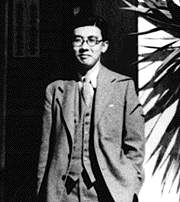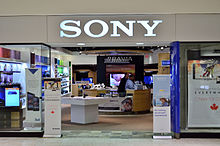History[edit]
Main article: History of Sony
Tokyo Tsushin Kogyo[edit]
Sony began in the wake of World War II. In 1946, Masaru Ibuka started an electronics shop in a department store building in Tokyo. The company had $530 in capital and a total of eight employees.[10] In the following year he was joined by his colleague,[clarification needed] Akio Morita, and they founded a company called Tokyo Tsushin Kogyo[11][12] (Tokyo Telecommunications Engineering Corporation). The company built Japan's first tape recorder, called the Type-G.[11] In 1958 the company changed its name to "Sony".
Sony name change[edit]
When Tokyo Tsushin Kogyo was looking for a romanized name to use to market themselves, they strongly considered using their initials, TTK. The primary reason they did not is that the railway company Tokyo Kyuko was known as TTK.[11] The company occasionally used the acronym "Totsuko" in Japan, but during his visit to the United States, Morita discovered that Americans had trouble pronouncing that name. Another early name that was tried out for a while was "Tokyo Teletech" until Akio Morita discovered that there was an American company already using Teletech as a brand name.[13]
The name "Sony" was chosen for the brand as a mix of two words. One was the Latin word "Sonus", which is the root of sonic and sound, and the other was "Sonny", a familiar term used in 1950s America to call a boy.[4] The first Sony-branded product, the TR-55 transistor radio, appeared in 1955 but the company name did not change to Sony until January 1958.[14]
At the time of the change, it was extremely unusual for a Japanese company to use Roman letters to spell its name instead of writing it in kanji. The move was not without opposition: TTK's principal bank at the time, Mitsui, had strong feelings about the name. They pushed for a name such as Sony Electronic Industries, or Sony Teletech. Akio Morita was firm, however, as he did not want the company name tied to any particular industry. Eventually, both Ibuka and Mitsui Bank's chairman gave their approval.[11]
Globalization[edit]
According to Schiffer, Sony's TR-63 radio "cracked open the U.S. market and launched the new industry of consumer microelectronics." By the mid-1950s, American teens had begun buying portable transistor radios in huge numbers, helping to propel the fledgling industry from an estimated 100,000 units in 1955 to 5 million units by the end of 1968.[citation needed]
Sony co-founder Akio Morita founded Sony Corporation of America in 1960.[10] In the process, he was struck by the mobility of employees between American companies, which was unheard of in Japan at that time.[10] When he returned to Japan, he encouraged experienced, middle-aged employees of other companies to reevaluate their careers and consider joining Sony.[10]The company filled many positions in this manner, and inspired other Japanese companies to do the same.[10] Moreover, Sony played a major role in the development of Japan as a powerful exporter during the 1960s, 1970s, and 1980s.[15] It also helped to significantly improve American perceptions of "made in Japan" products.[16] Known for its production quality, Sony was able to charge above-market prices for its consumer electronics and resisted lowering prices.[16]
In 1971, Masaru Ibuka handed the position of president over to his co-founder Akio Morita. Sony began a life insurance company in 1979, one of its many peripheral businesses. Amid a global recession in the early 1980s, electronics sales dropped and the company was forced to cut prices.[16] Sony's profits fell sharply. "It's over for Sony," one analyst concluded. "The company's best days are behind it."[16] Around that time, Norio Ohga took up the role of president. He encouraged the development of the Compact Disc in the 1970s and 1980s, and of thePlayStation in the early 1990s. Ohga went on to purchase CBS Records in 1988 and Columbia Pictures in 1989, greatly expanding Sony's media presence. Ohga would succeed Morita aschief executive officer in 1989.[citation needed]
Under the vision of co-founder Akio Morita[17] and his successors, the company had aggressively expanded into new businesses.[15] Part of its motivation for doing so was the pursuit of "convergence," linking film, music, and digital electronics via the Internet.[15] This expansion proved unrewarding and unprofitable,[15] threatening Sony's ability to charge a premium on its products[17] as well as its brand name.[17] In 2005, Howard Stringer replaced Nobuyuki Idei as chief executive officer, marking the first time that a foreigner had run a major Japanese electronics firm. Stringer helped to reinvigorate the company's struggling media businesses, encouraging blockbusters such as Spider-Man while cutting 9,000 jobs.[15] He hoped to sell off peripheral business and focus the company again on electronics.[17] Furthermore, he aimed to increase cooperation between business units,[17] which he described as "silos" operating in isolation from one another.[18] In a bid to provide a unified brand for its global operations, Sony introduced a slogan known as "make.believe" in 2009.[citation needed]
Despite some successes, the company faced continued struggles in the mid- to late-2000s.[15] In 2012, Kazuo Hirai was promoted to president and CEO, replacing Sir Howard Stringer. Shortly thereafter, Hirai outlined his company-wide initiative, named "One Sony" to revive Sony from years of financial losses and bureaucratic management structure, which proved difficult for former CEO Stringer to accomplish, partly due to differences in business culture and native languages between Stringer and some of Sony's Japanese divisions and subsidiaries. Hirai outlined three major areas of focus for Sony's electronics business, which include imaging technology, gaming and mobile technology, as well as a focus on reducing the major losses from the television business.[19]
In February 2014, Sony announced the sale of its Vaio PC division to a new corporation owned by investment fund Japan Industrial Partners and spinning its TV division into its own corporation as to make it more nimble to turn the unit around from past losses totaling $7.8 billion over a decade.[20] Later that month, they announced that they would be closing 20 stores.[21] In April, the company announced that they would be selling 9.5 million shares in Square Enix (roughly 8.2 percent of the game company's total shares) in a deal worth approximately $48 million.[22] In May 2014 the company announced it was forming two joint ventures with Shanghai Oriental Pearl Group to manufacture and market Sony's PlayStation games consoles and associated software in China.[2


No comments:
Post a Comment